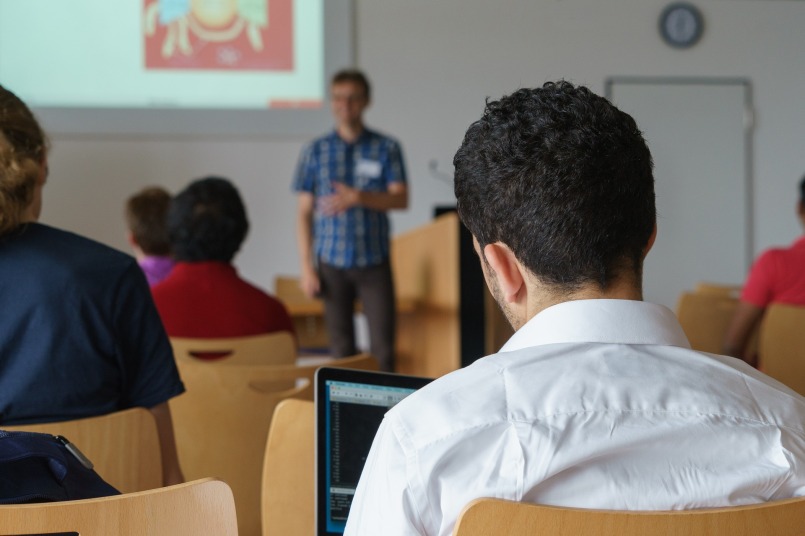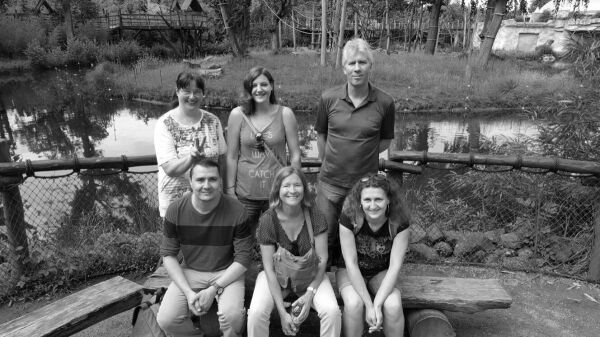B.Sc. Computer Engineering
Study period
6 semesters (3 years)
Credits
180
Study begin
Winter semester
Study place
Campus Duisburg
Language
50% German & 50% English
Description
Students in the Bachelor's program "Computer Engineering" are taught the knowledge and skills they need in their professional lives as engineering-oriented computer scientists. At the same time, they acquire competencies that qualify them for further master's studies in this subject. Through a basic and method-oriented education and by teaching them the working techniques of computer science from an engineering perspective, they are put in a position to make valuable contributions in their field of application as graduates from the very beginning and also to adapt to future computer science technologies in a sustainable manner.
Basic engineering and science subjects include physics, chemistry, electrical engineering, mechanics, and mathematics subjects relevant to engineering computer science. Finally, there are technical and non-technical electives.
Building on this, the program offers a balanced combination of modules in engineering informatics and general engineering and scientific basic subjects in the core area, which are finally integrated in a practical project and applied in the Bachelor's thesis. These include digital technology fundamentals, circuit design, computer architecture, basic programming, and operating systems.
The undergraduate program "Computer Engineering" is based on the fundamentals described above and the core area with the two specializations
- "Software Engineering" and
- "Communications"
which lead to a profiling of the graduates in the direction of computer science and electrical and communications engineering, respectively, and thus offer the graduates specific career prospects. Here, students also learn to communicate with colleagues from different disciplines on a professional level.
The profile "Communications" deepens the theoretical basis of communications and circuit technology and focuses on the area of signals and systems from various aspects, including computer networks. Databases and programming methods from an engineering perspective complete the profile. This prepares graduates primarily for the following professional fields:
- Design and operation of communication technology components and systems.
- Software engineering for communication technology applications
- Development of application-specific systems in the field of integration of communication and computer technology.
The graduates
- master basic engineering and scientific knowledge and methods as well as the associated ways of thinking.
- master basic technical knowledge from the field of programming and algorithms.
- have specialized knowledge from the field of computer systems.
- have specialized knowledge in the field of communication systems.
- are qualified for the choice of one of the two possible specializations and the selection from further elective subjects, through which the students can follow their inclinations to qualify for a profession or an academic career.
- have a deepened general education with a strengthening of linguistic competence in German and English as well as a strengthening of professional competence by learning teamwork and communication skills.
- have experience in the future professional field and are able to critically review scientific knowledge and professional practice in their respective interrelationships.
- have gained experience in independently working on a problem from the respective field of engineering within a given period of time using scientific methods and presenting it in an understandable way.
The profile "Software Engineering" deepens the theoretical basis of computer science and focuses on software engineering from different aspects. Databases, modeling methods and operating systems from a computer science perspective round out the profile. This prepares graduates primarily for the following professional fields:
- Programming on different application levels
- Software engineering for technical or engineering-oriented applications
- Development of application-specific systems using software technologies and databases.
The graduates
- master basic engineering and scientific knowledge and methods as well as the associated ways of thinking.
- master basic technical knowledge from the field of programming and algorithms.
- have specialized knowledge from the field of computer systems.
- have specialized knowledge in the field of communication systems.
- are qualified for the choice of one of the two possible specializations and the selection from further elective subjects, through which the students can follow their inclinations to qualify for a profession or an academic career.
- have a deepened general education with a strengthening of linguistic competence in German and English as well as a strengthening of professional competence by learning teamwork and communication skills.
- have experience in the future professional field and are able to critically review scientific knowledge and professional practice in their respective interrelationships.
- have gained experience in independently working on a problem from the respective field of engineering within a given period of time using scientific methods and presenting it in an understandable way.
Study at UDEStudy plan
Study plan
Study plan
You can find the examination regulations for your study program here: Examination regulations according to study programs
Study plans as well as information about the modules in the study program can be found in the module database VDB:
| Computer Engineering (Communications) | Graphic illustration |
| Computer Engineering (Software Engineering) | Graphic illustration |
Information material
Study plans as well as information about the modules in the study program can be found in the module database VDB:
Admission
Admission requirements
- general higher education entrance qualification (Abitur)
- a relevant subject-linked university entrance qualification
- a certificate recognized as equivalent by law or by the competent state authority
- those qualified in vocational training (an entrance examination is required in this case)
For foreign applicants who are not treated as equivalent to Germans by or on the basis of international treaties:
- if no university entrance qualification can be proven, proof of the ability to study by means of a special examination
- after successful attendance of an educational institution abroad with a degree that entitles the holder to study there: passed entrance examination of the University of Duisburg-Essen
Admission
Unrestricted admission (study places are not limited)
Enrollment takes place during the enrollment period at the student registrar's office on Campus Duisburg.
Prospective students from non-EU countries submit their application to uni-assist by 15.07. This applies to all German-language Bachelor's degree programs and includes applications for direct admission to the study program, for DSH direct admission, and for the preparatory German course. For more information please check the homepage of the International Office.
Special enrollment requirements
Sufficient knowledge of English and German language is required for enrollment (for more details, see "Language skills").
Foreign applicants who do not have the same status as Germans by or on the basis of international treaties and who do not have a university entrance qualification obtained in Germany must additionally prove their eligibility to study in a special examination. The special eligibility to study in the sense of sentence 1 is considered to be proven, if the applicant has taken mathematics in the last 3 years of the previous education, entitling him/her to direct university admission and has achieved a grade of 2.0 or better. When converting the grades, country-specific distinctions are taken into account as specified by the examination board.
Pre-courses
You can find a selection of for non-mandatory, but recommended preliminary courses at Mintroduce.
ISE Examination Board
University of Duisburg-Essen
Faculty of Engineering
SG 182
Geibelstr. 41, 47057 Duisburg
pa-ise@uni-due.de
Language Skills
Applicants who have not acquired their study qualification at a German-speaking institution must provide evidence of German language skills corresponding to the completed level B1 of the European Framework of Reference for Languages (CEFR). Applicants must demonstrate knowledge of English corresponding to the completed level B1 of the European Framework of Reference for Languages at the time of enrollment.
Study in a bachelor's degree program in ISE requires proof of level B2 in both languages as a condition of graduation. The language courses required for this in individual cases are components of the degree program. Students must take placement tests immediately at the beginning of their studies to determine their proficiency in German and English and to be placed in courses according to sentence 1. German language skills corresponding to level B2 are a prerequisite for admission to the German-language modules, as well as for admission to the German-language examinations from the 3rd semester onwards.
Internships during studies
During the Bachelor's program, students must complete a 12-week internship. It is part of the study program and must be proven at the latest when registering the bachelor thesis.
In the course of studies, the internship should complement the studies and deepen acquired theoretical knowledge in its practical relevance. During the internship, the intern has the opportunity to get to know individual areas of an industrial company and to apply the knowledge acquired during the course of study. Another important aspect is the understanding of the sociological side of entrepreneurial activities. The intern must also understand the company as a social structure and get to know the relationship between managers and employees in order to correctly classify his or her future position and potential impact.
Study-related stays abroad
For students who have acquired their university entrance qualification at a German institution, a stay abroad of three to six months is obligatory. The stay abroad can be completed to acquire credit points, to complete the bachelor's thesis or to complete practical working experience.
General Information
Living & Studying at the University of Duisburg-Essen

Semester
The academic year is divided into semesters.
- Winter semester: from October to March
- Summer semester: from April to September

Lecture period
The winter lecture period usually starts in mid-October and ends in mid-February. In summer, the lecture period usually starts in mid-April and ends in July. During the winter semester there is a break of about two weeks during the Christmas holidays.

Examination phase
The examination phase begins about one week after the end of the lecture period and lasts about seven weeks.
Semester fee
All students have to pay a semester fee (social contribution) of about 320,- Euro per semester. You can find the current amount here. The social contribution includes, among other things, a semester ticket for public transportation in North Rhine-Westphalia and discounts on meals in the university's canteen and cafeteria.
Living expenses
We recommend to consider approximately 800 to 1000 Euro of personal expenses per month.
Accommodation
Accommodation is possible in dormitories of the Studierendenwerk and in premises of the free housing market. The rent in a room in a student dormitory is about 300,- Euro per month. You can find more information about housing options here.

January 2022Yasseen Nandally
"I graduated from the course ISE B.Sc. Computer Engineering with minor in Software Engineering. The reason I opted for this course was I am deeply passionate about technology. During my studies I had the chance to explore those areas and some of the most interesting part were when you see the application of those subject you are studying. A few examples were the course Security in networking, where one learns how encryption is used on a daily basis for many things such as banking transactions, ensuring safe communications on the internet etc. Furthermore, UDE has given me the chance to realize my dreams. I always wanted to be an engineer as a child and find myself in the tech industry one day. I'm glad I realized it here. Moreover, being passionate about mathematics and numbers, previously I couldn't find where and how I can follow my passion and somehow put it to good use. Once again, I found it here at UDE. Even though I was an engineering student, I had the opportunity to write my bachelor thesis in Mathematics, more specifically in the field of number theory (Topic: A sieve for finding primes in a range), and it was also published. I would like to thank my supervisors for this.
The time I spent here during my studies was not easy at all. I was on a sailing team the whole degree. But with hard work, dedication and passion, it is possible. I didn't get here alone, family and friends, mentors, teachers and of course my parents, all worked together to make me possible. I want to recognize everyone whose hard work made me possible today."
Introduction of the institutes
Contact
You have questions? We have answers!

Support Center for (International) Engineering Students Student advisory service
SG 119
Geibelstr. 41
47057 Duisburg
Tel.: +49 (0)203 379 3776
E-mail: scies@uni-due.de

Student council ISE - International Studies in Engineering
We are your point of contact! If you have questions about your studies or general concerns about us or our lecturers, you can contact us. We will solve your problems and answer your questions directly if possible or forward you to the right people. Just write us an email (info@isefs.uni-due.de) or on Facebook!
For prospective students and enrolled students General student counseling
ABZ offers counseling to prospective students, enrolled students and graduates on all questions concerning the choice of study program, studies and the transition into working career.
Support in the Faculty
Jens Krüger













